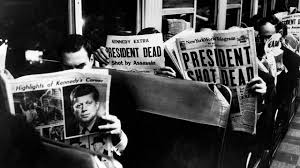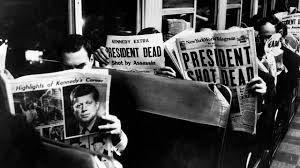Today marks the 54th anniversary of the assassination of President John F. Kennedy, who famously said,
The very word “secrecy” is repugnant in a free and open society; and we are as a people inherently and historically opposed to secret societies, to secret oaths and to secret proceedings…
Isn’t that the ultimate of ironies, given that the “investigation” into his assassination was shrouded in secrecy and continues to be shrouded in secrecy?
It’s been that way since the day of the assassination. Everything was said to involve “national security,” which were (and are) the two most important words in the American political lexicon. Most of the proceedings of the Warren Commission, which was charged with pinning the assassination on Lee Harvey Oswald, were conducted in secret. The commission ordered that records relating to its proceedings be kept secret from the American people … for 75 years! When Warren was asked if Americans would ever be permitted to see the records, he responded, “Yes, there will come a time. But it might not be in your lifetime….”
Immediately upon JFK’s death, a team of Secret Service agents, following orders from new President Lyndon Johnson, forced their way out of Parkland Hospital, where the president had died. Brandishing guns and screaming profanities, they made it clear to Dallas Medical Examiner Earl Rose that they had absolutely no intention of complying with Texas law, which required that Rose conduct an autopsy.
They took the body to Dallas Love Field, where Johnson was waiting for it. The body was delivered into the hands of the military in Maryland, which conducted an autopsy under top-secret conditions. Military personnel who participated in the autopsy were required to sign secrecy oaths in which they promised never to reveal what they had seen.
In the 1990s, thanks to Oliver Stone’s movie JFK, the American people came to the realization that the CIA, the military, and other national-security state agencies were still shrouding their assassination records in secrecy. Public pressure caused Congress to enact the JFK Records Act in 1992, which ordered the CIA, the military, FBI, Secret Service, and other national-security state agencies to show their assassination records to the American people.
That was when it dawned on a lot of Americans that the military had conducted a false and fraudulent autopsy on the president’s body. The evidence is detailed in my book The Kennedy Autopsy but I’ll share one example here. Saundra Spencer was petty officer in charge of the White House Laboratory at the Naval Photographic Center in Washington, D.C. She dealt with classified documents and worked closely with the White House. It would be virtually impossible to find a more credible witness than Saundra Spencer, and no one anywhere has ever questioned her competence and veracity.
When Spencer testified before the Assassination Records Review Board in the 1990s, she was shown the official autopsy photographs. She said that those photographs were not the ones she was asked to develop on the weekend of the assassination. The ones she developed showed a big exit-sized hole in the back of the president’s head. The official photographs she was shown showed the back of the president’s head to be intact.
Spencer’s testimony matched the statements of the Dallas doctors and nurses who treated Kennedy. They too said the president had a big exit-sized hole in the back of his head.
Why is that important? Because a big exit-sized hole in the back of the president’s head means the headshot that killed Kennedy came from the front. Oswald, the person who the Warren Commission concluded shot the president, was situated in the rear.
For some reason, perhaps pressure on Congress from the CIA and the military, the JFK Records Act gave the CIA and the military another 25 years of secrecy, which undoubtedly felt like a long time away back in the 1990s. That deadline expired on October 26, 2017.
Not surprisingly, however, the CIA said it needed even more time for secrecy. It wants to continue keeping its assassination records secret from the American people. Unfortunately, President Trump, at the very day of the deadline, granted the request. Notwithstanding all the hoopla in the mainstream press about the “release” of the JFK records, some 95 percent of the remaining records in the National Archives are being kept secret from the American people.
Not surprisingly, there has been nary a peep of protest from the mainstream press, which has blindly deferred to authority since November 22, 1963, automatically buying into the standard “national security” line that the CIA and the military have used to justify their secrecy in the JFK assassination for more than 50 years. It just doesn’t occur to these people that the reason for continued secrecy is not “national security” but rather the need to keep the most incriminating circumstantial evidence secret forever, or at least for another 25 years.
Perhaps all those mainstream commentators have never read what President Kennedy said about secrecy or perhaps they just don’t care:
“The very word “secrecy” is repugnant in a free and open society; and we are as a people inherently and historically opposed to secret societies, to secret oaths and to secret proceedings….
For more information, see:
The Kennedy Autopsy by Jacob Hornberger
JFK’s War with the National Security Establishment: Why Kennedy Was Assassinated by Douglas Horne
Regime Change: The JFK Assassination by Jacob Hornberger
The CIA, Terrorism, and the Cold War: The Evil of the National Security State by Jacob Hornberger
CIA & JFK: The Secret Assassination Files by Jefferson Morley
“The National Security State and JFK,” a FFF conference featuring Oliver Stone and ten other speakers
“Altered History: Exposing Deceit and Deception in the JFK Assassination Medical Evidence,” a five-part video by Douglas P. Horne
Reprinted with permission from Future of Freedom Foundation.



